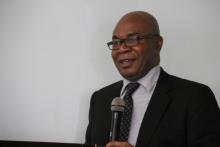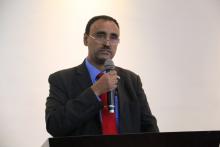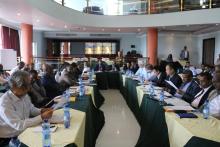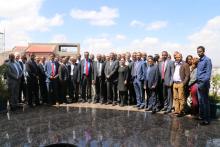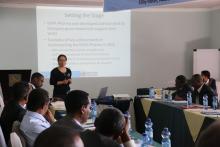Implementation of the National Strategy and Plan of Action for Pharma (NSPA-Pharma): Ethiopia Getting Momentum being a Pioneer Country
May 22, 2017 Addis Ababa: Conference on implementation and up-dating of the National Strategy and Plan of Action (NSPA) for pharmaceutical manufacturing development in Ethiopia organized by Ministry of Industry, Ministry of Health and World Health Organization to review the implementation of 2016 plan and up-date the NSPA Pharma.
The conference was attended by State Ministers from Ministry of Industry (MoI), Ministry of Health (MoH), Ministry of Science and Technology (MoST) and Deputy Commissioner of Ethiopian Investment Commission (EIC). Moreover, WHO Representative to Ethiopia, WHO Head Quarter, UNIDO, UNCTAD, academician, private companies, and other government and non-government stakeholders took part on this meeting which was held on May 9 – 10, 2017 at Ellily International Hotel, in Addis Ababa.
H.E. Dr. Mebrahtu Meles State Minister to Ministry of Industry in his opening remark emphasized that “Local pharmaceutical manufacturing is one of the top global as well as regional agenda and ensuring its implementation has public health and economic benefits to the country.”
Dr Akpaka A. Kalu, WHO Ethiopia Country Representative in his keynote address said that “WHO will continue supporting the government effort in implementation of the NSPA - Pharma in accordance with its competence and collaboratively work with the government of Ethiopia and development partners.”
Ethiopia launched NSPA - Pharma (2015-2025) in 2015, with support from WHO, with eight strategic objectives that includes improving access to medicines through quality local production – implementing GMP roadmap, strengthening the national medicines regulatory system, encouraging cluster development and production of active pharmaceutical ingredients (APIs), and attracting foreign direct investments (FDIs) in the pharmaceutical sector. Ethiopia is the pioneer country for the implementation of the Pharmaceutical Manufacturing Plan for Africa (PMPA).
Dr. Jicui Dong, Programme Manager for Local Production, Regulatory Systems Strengthening (RSS), Regulation of Medicines and other Health Technologies (RHT), Department of Essential Medicines and Health Products (EMP) from WHO HQ started with a presentation of WHO’s perspective on local production of pharmaceutical products, WHO’s activities on local production, challenges and the way forward. Other presentations made in the conference include the assessment report of Ethiopian pharmaceutical manufacturers’ status on the national Good Manufacturing Practice (GMP) roadmap which was developed by EFMHACA, 2016 performance report of the implementation of the NSPA - Pharma and the 2017 Implementation Plan.
Various studies undertaken have shown inadequate access to essential medical products in developing countries including Ethiopia. To mitigate WHO has been promoting and undertaking various strategic initiatives to ensure access to safe, efficacious and quality essential medical products with objective of ensuring improved access to quality health service and universal health coverage.
During the conference achievements and challenges has been identified and actionable recommendations were forwarded to be used for revision of the live NSPA document and developing sustainable mechanism of implementation of the NSPA.
Second meeting was organized on May 11, 2017 by MOI, MOH, WHO and Regional Bio-equivalent Center (RBEC) which was established in Nov. 2012 as public and private partnership to provide bio-equivalence testing for pharmaceutical companies in Ethiopia, Kenya, Tanzania and Uganda. The meeting was organized in order to establish a consortium of supporters for the RBEC that will enable the center to mobilize technical and financial support and thereby undertake its operation in a sustainable manner.
Dr Akpaka A. Kalu, WHO Ethiopia Country Representative in his keynote address emphasized the importance of RBEC for assuring safety and efficacy of generic medicine by ensuring interchangeability of generic medicine with innovator or comparator product. Dr. Jicui Dong, Programme Manager of Local Production RSS/RHT/EMP/WHO HQ shared that WHO would consider providing technical support in accordance with current WHO practices and procedures.
The meeting was held in the presence of higher officials from the Ministry of Industry and Ministry of health, WHO Representative to Ethiopia, WHO HQ, UNICEF, UNFPA, UNAIDS, USAID, USP/PQM, BMGF, academician, private companies from Ethiopia and Kenya, and other government and non-government stakeholders on May 11, 2017 at Ellily International Hotel, in Addis Ababa.
The presentations made in the meeting addressed the RBEC Background, history, current status, projects and challenges, RBEC two studies undertaken, RBEC Business Plan and Expectations. This meeting also helped to identify strength and key challenges of the RBEC and come out with recommendations to strengthen the RBEC and to establish ad hoc committee that will develop TOR for establishment of consortium of supporters for RBEC.
Below:
01 Dr Akpaka A. Kalu, WHO Ethiopia Country Representative speaking at the opening of the conference
02 Dr. Mebrahtu Meles, State Minister to Minister of Industry, making opening remark
03 Participants attending the NSPA – Pharma conference
04 Group picture of NSPA – Pharma conference participant




